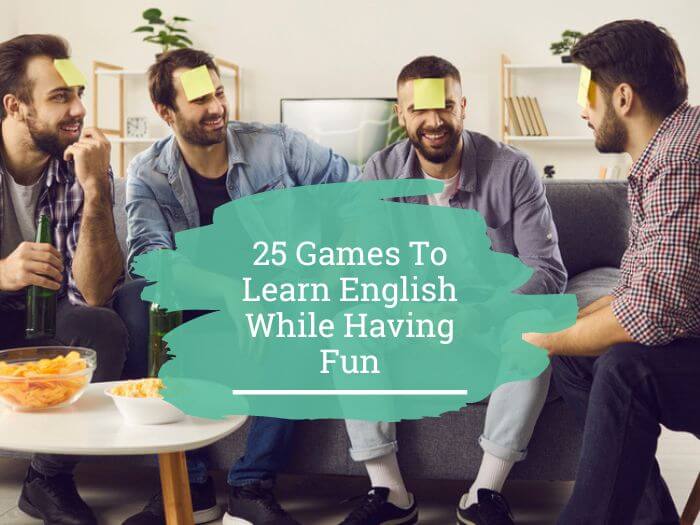Maybe you think learning English is boring because of how you learned it in the past.
I encourage you to rethink that. Language learning can be a playful activity, and using games to learn English is one way to make it fun.
Would you like to know 25 games to learn English you could play?
Okay then, let’s learn english by playing games!
Table of Contents
1. Twenty Questions

Min number of players: 2
How it works
You think of something (an object, an animal, a country, a person, etc.) without saying what it is. The other players ask you up to 20 questions to guess what you’re thinking of.
They can only ask yes/no questions (questions whose answer can only be yes or no). For example, “Is it big?” “Can it walk?” “Does it live in the desert?” If after 20 questions they still have no idea what you’re thinking of, you win and they lose.
You can also play it online here or here.
Twenty Questions is good for:
Practising questions and speaking.
2. Story Cubes
Min number of players: 2
How it works
Story Cubes are a set of dice with a picture on each side. You can buy these or you can use the Story Dice website for free. There are many ways to play with Story Cubes. Here are three:
- Roll the dice and write a funny short story that includes all the pictures. You can set a time limit for this. The person who writes the funniest story wins.
- Roll one die and begin telling a story including the picture you’ve just got. The next player rolls another die and continues the story with another picture. Keep going for as long as you like. The funnier the sentence, the more interesting the game becomes.
- Roll the die and use the images to practise a particular grammatical structure. For example, if you decide to practise comparatives and you get a picture of an elephant and one of a tree, you could say, “An elephant is not as green as a tree.” If the other players accept your sentence, you get a point. If not, you lose it. And if you can’t make a sentence, you lose one too!
Good for:
Many things! It depends on how you decide to use Story Cubes. The three games above are good for practising fluency, grammar, speaking, and storytelling skills.
3. Stop The Bus (Also Known As Scattergories)

Min number of players: Ideally 3 or more.
How it works
You may have already played Stop the Bus in your first language.
You’ll need paper and pens for each player, a timer, and a list of categories (e.g., animals, countries, fruits, famous people, etc.). You can use this online tool to generate categories.
One player chooses a letter of the alphabet (here’s another online tool for this). Set a timer and write down a word that starts with the chosen letter for each category. For example, if the letter is “B,” you may have the following:
| Animals | Countries | Fruits | Colours | Famous people |
| Bear | Bolivia | Banana | Black | Barack Obama |
Keep thinking, keep writing. Keep the bus going!
The first player who completes all the categories shouts “Stop the Bus!” At this point, all players must stop writing immediately.
Each player reads out their answers. If more than one players have the same word in a category, they each get 1 point. If a player has a unique word that no one else has written, they get 2 points. If a player doesn’t have a word for a category, they get no points (for that category only).
Play as many rounds as you like using other letters.
When you decide to stop, add up your points for each round. The player who has the most points wins.
You can also play it online or on the app.
Good for:
Speaking, vocabulary, and spelling.
4. Question Tennis
Min number of players: 2
How it works
Make a list of topics and pick one you want to discuss. Start giving a short monologue about it. When you run out of things to say, end your turn by asking the other player a question.
For example, let’s say you’ve decided to talk about music. You can say, “My favourite music is heavy metal. I’ve been listening to Metallica since I was a teenager and have been to many heavy metal concerts. But I also like jazz and funk. What about you?”
The other player must answer your question and end their turn by asking you another question.
The first player who can’t or forgets to end the turn with a question loses the round. At this point, you can move on to the next topic and play another round.
The player who wins the most rounds wins the game.
Good for:
Conversation skills, speaking fluency, listening, forming questions, and practising topic-related vocabulary.
5. Don’t Say “Yes” Or “No”
Min number of players: 2
How it works
“Do you like Indian food?”
“Yes!”
You’ve just lost the game.
To win, don’t answer questions with “yes” or “no”. The other players will keep asking you questions. You’ll see how excited and alert they’ll get when they ask you things like, “Are you okay today?” or “Do you love your mom?”
Don’t give in!
You can say, “I am. In fact, I’ve never felt better!” or “She’s the person I love the most.”
Anything except “yes” or “no”.
Good for:
Asking questions, listening, fluency, and practising giving long answers.
6. Pictionary

Min number of players: 4
How it works
Divide your group of friends into at least two teams. Set a time limit. One player from each team draws a word and their teammates try to guess the word based on the drawing. The first team to guess the word wins the round.
Pictionary is a classic. You can buy the boardgame, or use the Online Pictionary Word Generator.
There’s also an online version that allows you to play with AI. It’s called Iconary and you can play it here.
Good for
Vocabulary, speaking, modal verbs (e.g. That can’t be a… / That must be a…), questions (e.g. Why does your elephant have a beak???).
7. Conditional Circles
Min number of players: 2
How it works
One player makes a conditional sentence.
If I had a million dollars, I would travel to Australia every six months.
The next player makes a new conditional sentence that starts with the second half of the previous one.
If I travelled to Australia every six months, I would see a lot of kangaroos.
And so on…until you’ve run out of ideas or get bored.
If I saw a lot of kangaroos, I would…
You can play this game with ChatGPT too. Download the free app, give ChatGPT the instructions for the game, and speak to it.
Good for:
Speaking, and practising zero, first, second, third, or mixed conditional sentences.
8. Charades

Min number of players: 4
How it works
Charades is similar to Pictionary. The only difference is that you don’t draw the words. You act them out without speaking.
Your team can shout out as many guesses as they like and score a point for every word they guess. Set the time limit to 1 to 2 minutes to keep up the pace of the game.
You can buy the game or make a list of word cards by yourself.
Good for:
Revising vocabulary you’ve studied.
9. Scrabble
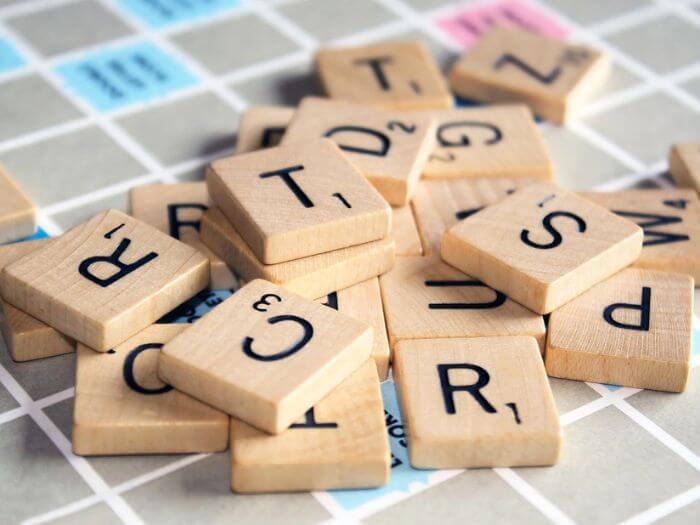
Min number of players: 2
How it works
Who doesn’t know Scrabble?
In short, you take turns forming words on a board using word tiles. You can place your words horizontally or vertically, but you must connect them with existing words on the board. You get a point for each letter.
You can play Scrabble online for free or buy the board game.
Good for:
Vocabulary and spelling.
10. Trivial Pursuit
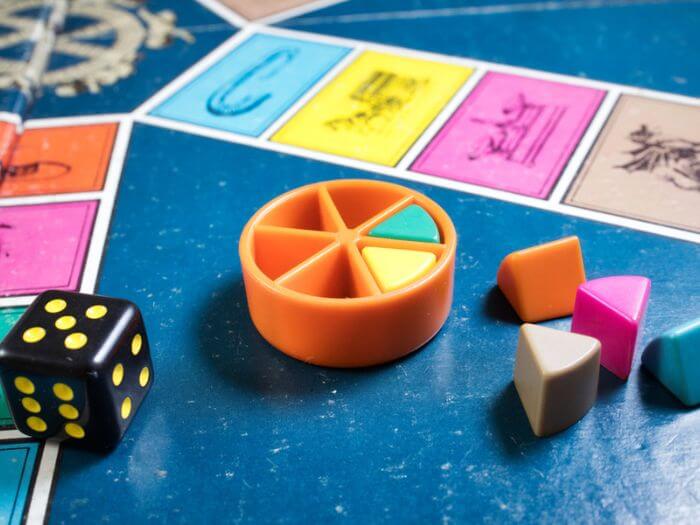
Min number of players: 4
How it works
Trivial Pursuit is another popular game. It has been around since 1981, so you might be well familiar with it.
You and your team will answer trivia questions taken from six categories. The Classic Edition I have includes Geography, Entertainment, History, Art and Literature, Science and Nature, and Sports and Leisure.
The questions may be open-ended (e.g. Who was the first president of the United States?), multiple choice (e.g. How many people live in Italy? A. Under 30 million B. Between 30 and 60 million C. Over 60 million), or true/false (e.g. Brazil is the largest country in South America).
These sorts of questions usually generate a lot of discussion, which is great news for you because you’ll get to practise your speaking.
The object of the game is to “get a degree” in all categories.
Okay, the rules are a bit more complex than this, but I’ll let you discover the game by yourself.
If you don’t want to buy Trivial Pursuit, you can play it online.
Oh, the correct answers to the questions above are:
1. George Washington
2. True (8,515,767 km2)
3. C – over 60 million
Good for:
Speaking, discussion, debates, and conversation.
11. Monopoly

Min number of players: 2
How it works
It’s one of the most popular board games of all time, so I refuse to explain how it works (lol!). But you’ll find the rules and more information here.
I hope you’ll still like me!
Good for
You won’t believe how much talking you’ll be doing by playing Monopoly. You’ll have to negotiate, persuade, haggle, count, read cards aloud, and ask and answer questions. It’s just one of the best games to learn English, especially spoken English.
12. First Letter, Last Letter
Min number of players: 2
How it works
You say a word and the next person has 5 seconds to say another word starting with the last letter of your word. So, if you say “tree,” I can say “elephant.” Then you can say “table” and so on. You score a point every time the other player can’t come up with a word.
If you want, you can restrict the focus by defining word categories (only nouns, only words around sports, only 5-letter words, and so on). You can also decide to say full sentences instead of just words.
There’s an online version too that you can play by yourself or with friends!
Good for:
Vocabulary and speaking.
13. Fluency “4-3-2”
Min number of players: 3
How it works
This is more of an activity than a game because no one wins or loses anything.
Step 1: Choose a topic you can talk about with little difficulty. Prepare a talk on this topic without making notes.
Step 2: Set a time limit of 4 minutes. Start the timer and give a 4-minute speech to one of the other players. They must not speak, interact, or ask you questions.
Step 3: Once the time’s up, stop talking, change partner, and give the same talk. This time you have 3 minutes only.
Step 4: After 3 minutes, stop, find another player, and give the same talk again. This time you only have 2 minutes to get to the end of your speech.
Good for:
Fluency! If you’re interested in why this game is so effective, read this.
14. Heads Up!

Min number of players: 2
How it works
When you play Heads Up!, you have to guess the word on your forehead based on clues other players give you. I’ve only played once and I had almost forgotten about this game.
I’m going to download the app right away.
Have a look at how it works here.
Good for:
Vocabulary, speaking, and listening.
15. Never Have I Ever
Min number of players: 2
How it works
Each player has 5 points.
You take turns saying “Never have I ever…” followed by something you've never done. For example, you might say, “Never have I ever been to Greece.”
If other players have done what you’ve never done (been to Greece in this case), they lose a point. The winner is the person who remains with more points.
Check out the party game or play it online.
Good for:
Speaking, listening, and practising the present perfect.
16. Lyrics Training

Min number of players: 1
How it works
Lyrics Training is a website/app you can use to learn English with music.
You play a music video of one of your favourite artists. The video automatically stops now and then, and you have to type in the missing word from the lyrics. If the word is correct, the video goes on. If not, it doesn’t.
There are several game modes: beginner, intermediate, advanced, and expert.
It’s a great game for you if you’d like to learn English with songs.
Good for:
Listening, vocabulary, and spelling.
17. Tell Me More About It

Min number of players: 2
How it works
This is a conversation game. You start talking about a topic. At the end of your turn, the other players challenge you to tell them more about what you’ve just said.
When they say, “Tell us more about it,” you have to keep talking! They can challenge you up to 5 times. If you’re able to “tell them more about it” you score a point. Play a few rounds. At the end of the game, the player who scored the most points is the winner.
This is a great game to play on a car journey!
Good for:
Fluency, speaking, and conversation
18. Scotland Yard
Min number of players: 2
How it works
Scotland Yard is one of my all-time favourite board games. You and your team will cooperate to catch one of the players – a criminal who’s on the run in London.
You’ll have to make hypothesises and speak with your team to plan the best strategies and make the best next moves. This game will get you to speak and listen a lot!
You can buy the board game on Amazon.
19. Video Games

I’ve met many people who speak excellent English. When I asked them what they did to learn, a few of them said, “I learned through video games.”
It doesn't matter what type. Any video game that requires you to speak with other players is great for improving your English. People from all over the world play a lot of online video games these days.
They’re fun and useful. So…why not give it a go?
Check out this article on where to find gaming friends.
20. Cranium
Min number of players: 4
How it works
Cranium has been advertised as “The Game for Your Whole Brain” – and for good reasons. To win the game, you and your team will need to answer questions, solve word problems, spell words, solve anagrams, draw, sculpt, use charades, act, and whistle.
It’s an amazing party game to practise and improve your English.
Good for:
Reading, listening, speaking…many things!
21. Mindgames

Min number of players: 1
How it works
It really depends on what game you decide to play. On mindgames.com you’ll find plenty of online games to learn English.
The website is easy to use and you’ll find plenty of word games, number games, crosswords, and many others that you can play by yourself.
Good for:
Mainly vocabulary and spelling.
22. British Council Vocabulary Games
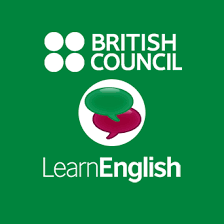
Min number of players: 1
How it works
On the British Council website there’s a section with vocabulary games to learn English you can play by yourself.
I’ve tried Sushi Spell, a challenging game where you have to take the sushi from a moving belt to spell as many words as you can in 2 minutes.
If you don’t like Sushi Spell, you could try Wordshake, the other game on the website.
Good for:
Vocabulary and spelling
23. BBC Learning English Quizzes
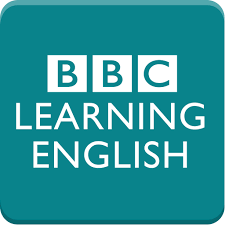
Min number of players: 1
How it works
On the BBC Learning English website you’ll find many quizzes about grammar and vocabulary.
Fill the gap, spot the error, correct the sentence – these are quick game-like tests you can play to check how much you know about English
You can find them here and here.
Good for:
Revising grammar and vocabulary
24. English Skills (App)
Min number of players: 1
How it works
English Skills is a popular app that helps you improve your grammar and spelling by playing games to learn English.
The application includes classic vocabulary games like Hangman and Word Search, as well as grammar questions and word order exercises. These games are divided into three levels: Beginner, Intermediate and Advanced.
You can download the app here (Android) or here (Apple)
Good for
Revising and improving your grammar and vocabulary.
25. Pogo.com
Min number of players: 1
How it works
Pogo.com is a cool website where you’ll find plenty of games. These are not designed for learners of English, but they can help you improve just the same.
Check out the word games. These are especially useful for you!
Good for:
Vocabulary
Games To Learn English & Another Tip To Have Fun

At the start of this post, I told you that one way to make learning English fun is by playing games for learning English.
What’s another way? Listening to and reading stories! That's what StoryLearning is all about.
A story is naturally rich in language: verbs, nouns, adjectives, tenses, numbers, and many other things!
Learning through stories will help you pick up the grammar and vocabulary in a natural, organic way, without spending hours doing textbook or grammar exercises. This is how the StoryLearning® method works.
Okay, maybe it’s not as great as Monopoly, but why not try this immersion method?

Olly Richards
Creator of the StoryLearning® Method
Olly Richards is a renowned polyglot and language learning expert with over 15 years of experience teaching millions through his innovative StoryLearning® method. He is the creator of StoryLearning, one of the world's largest language learning blogs with 500,000+ monthly readers.
Olly has authored 30+ language learning books and courses, including the bestselling "Short Stories" series published by Teach Yourself.
When not developing new teaching methods, Richards practices what he preaches—he speaks 8 languages fluently and continues learning new ones through his own methodology.
